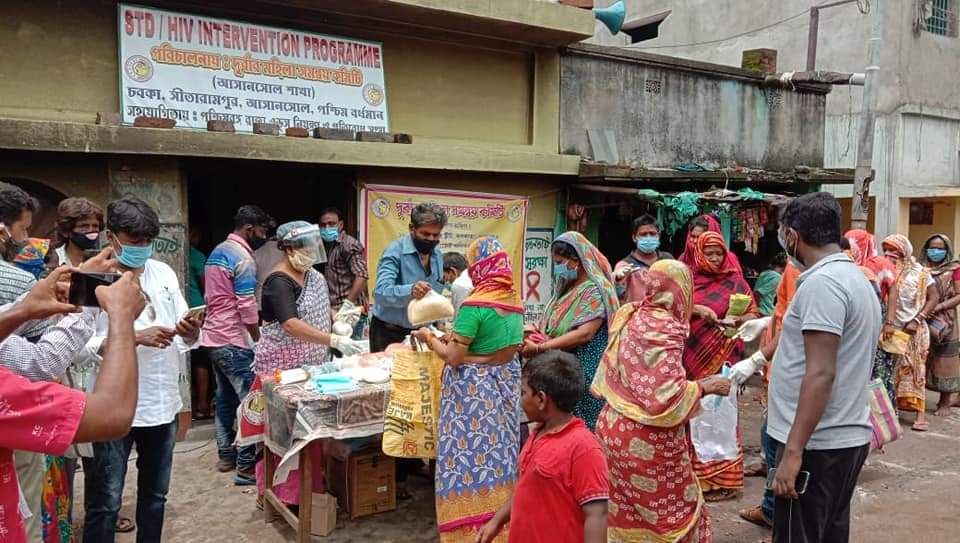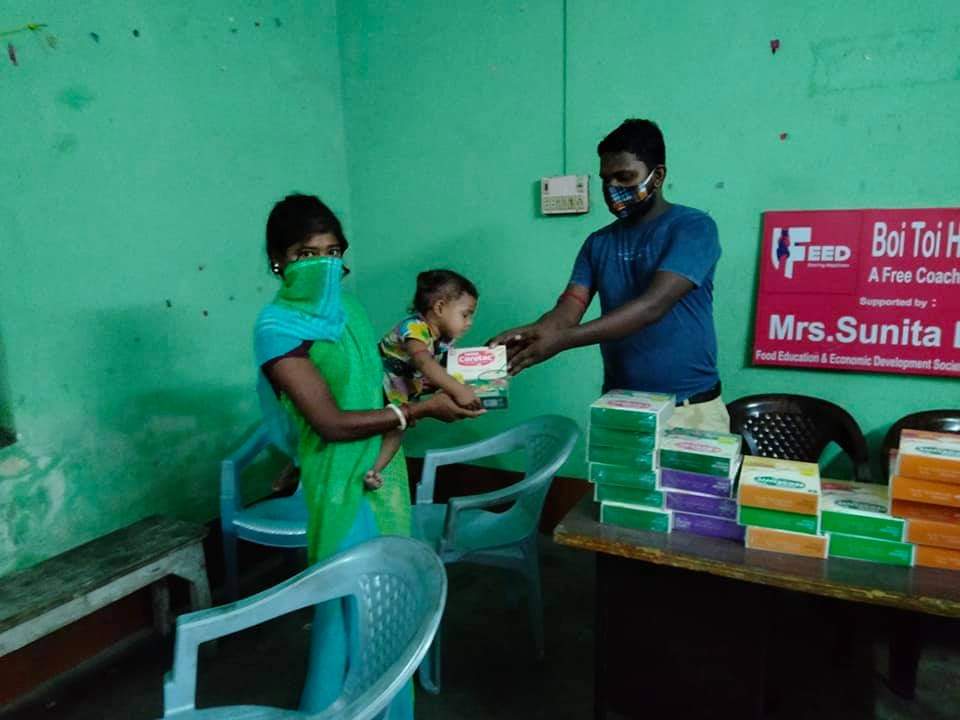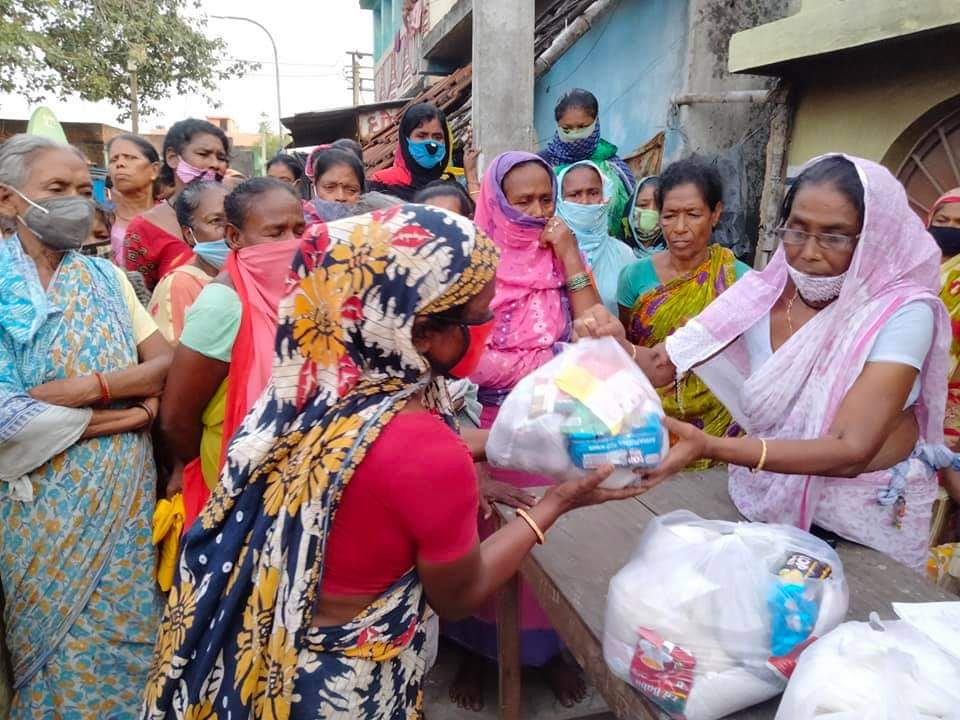‘Sex workers in Asansol sitting on a ticking time bomb of HIV/AIDS’
For four years now, the ‘Targeted Interventions Under National AIDS Control Programme’ is suspended in Asansol, West Bengal, because of which mandatory screening for HIV and free condom distribution to sex workers have stopped. This has put a spanner in the works for India’s fight against AIDS.


The mandatory HIV screening for sex workers has stopped in the red light areas. Photo: Gaon Connection
Asansol, West Bengal
Asansol is West Bengal’s second largest city and home to a large number of coal mines, factories and migrant workers. In its red light areas of Chabka, Lachipur and Sitarampur, thousands of sex workers eke a living. But, for the past four years, they have neither undergone the mandatory screening for HIV [human immunodeficiency virus] infection, nor have they received any free condoms or counselling on safe sex.
These are all part of the activities of the central government’s ‘Targeted Interventions Under National AIDS Control Programme’ being implemented by the National AIDS Control Organization (NACO).
Murshida Sheikh, a sex worker from Asansol, has been running from pillar to post to get these activities restarted in the red light areas of this district headquarters of Pashchim Bardhaman, which is located about 210 kilometres from Kolkata.
Two months ago, on July 7, Sheikh wrote to the project director of the West Bengal State AIDS Prevention and Control Society, Abhishek Tiwary, highlighting the dire status of the sexual health of her community members and their clients.
Also Read: COVID-19 And Sex Workers: Damned if they do, damned if they don’t
“More than a thousand sex workers live in the red light areas of Chabka, Lachipur and Sitarampur… These areas are full of mines and factories, close to the Jharkhand border, and situated along National Highway 2… STD [sexually transmitted disease] and HIV cases are increasing here, and blood tests are completely suspended,” the sex worker wrote in her letter.
“We are not getting condoms and the ICTC [Integrated Counselling and Testing Centre] is located over 18 km away and difficult to travel to,” pointed out Sheikh who is also president of Asansol Durbar Samiti, a community-based organisation associated with the Durbar Mahila Samanway Samiti, that represents over 65,000 sex workers in West Bengal.

When Targeted Interventions stopped
Till 2017, the NACO’s Targeted Interventions (TIs) worked efficiently in the neighborhoods in Asansol, with a number of services and facilities aimed at monitoring and improving the health of sex workers.
These workers underwent blood tests every three months to check for HIV infection, a doctor offered them free consultation and medicines for sexually transmitted diseases and other ailments thrice a week, and each one of them was provided with seven condoms per day.
Also Read: Masks, sanitisation, and no kissing: Sex workers have new rules for clients
Peer educators and outreach workers raised their awareness about HIV/ AIDS and sexual health and counselled them about safe sex practices, including the use of condoms. If required, the sex workers were connected to anti-retroviral treatment centres in case they tested positive for HIV.
However, things ran aground in early 2017 when sex workers and their families in red light areas accused some of the activists implementing the Targeted Interventions scheme of corruption. “They had no experience or exposure to sex work, did not even consult us about what interventions were required on ground, and swindled money,” Rabi Ghosh, field coordinator with Asansol Durbar Samiti, told Gaon Connection.

“We wrote to the district magistrate and the state government, complaining about corruption. We said we were ready to run the scheme on our own with full accountability,” said Ghosh, who is himself a son of a sex worker from Chabka. “But, after March 2017, funds for the scheme were stopped, and the scheme has not been restarted despite several letters and deputations to authorities,” he added.
Ghosh was an outreach worker under the Targeted Interventions scheme till March 2017 when things came to a grinding halt.
According to him, even the mandatory HIV screening for sex workers has stopped and not a single screening camp has been organised by the government in the red light areas.
“We did conduct blood tests in the neighbourhood on a few occasions with help from the Durbar Mahila Samanway Samiti, but these were few and far between. The distribution of condoms and awareness and counselling activities have also come to a complete halt as there are no funds,” Ghosh complained.

Importance and scope of TIs
Targeted Interventions, designed and implemented by the NACO in collaboration with state AIDS control societies and NGOs/ community based organisations, constitute the cornerstone of India’s fight against HIV/ AIDS.
Aimed at high risk groups like sex workers, the interventions include funding and institutional support for one peer educator and one outreach worker per 100 and 250 individuals, respectively. These educators and workers provide condoms, lubricants and medicines to beneficiaries, and monitor their health.
Also Read: “Yes, I am a sex worker and I have told this only to my daughter so that …”
Educators and workers are also supported by a doctor, a counsellor, a project manager, a project director and other staff at the cluster level, who organise regular health check-ups and awareness programmes, including mandatory HIV tests for all sex workers every six months as per the NACO guidelines.
Activists and community representatives from the sex workers’ community say that Targeted Interventions have been suspended in many red light areas in the country including places like Asansol that have a large floating population. This, according to them, has severely compromised India’s fight against AIDS and left sex workers and their clients highly vulnerable to HIV and other infections especially in the COVID19 pandemic.
“In addition to Asansol, targeted interventions for sex workers were suspended in many other parts of West Bengal like Islampur, Alipurduar, Panjipara and Suri for varying durations in the last two to three years,” Protim Roy from Durbar Mahila Samanway Samiti, told Gaon Connection.
“Since there was no periodic screening among sex workers, we just don’t know if they were HIV positive. Plus, during the lockdown, many of them returned to their native place, and carried on with sex work there, often without access to condoms, leaving the possibility of HIV infection and transmission wide open,” Roy said.
TIs suspended in several parts of India
Not just in West Bengal, Targeted Interventions have been suspended in other parts of the country too.
Also Read: Betrayed by the ballot: The hijra community of North Bengal
“Take Ajmer in Rajasthan, for instance – our data shows there are around three thousand five hundred sex workers in the district, and their clients include foreign tourists who visit Ajmer all year round,” Amit Kumar, coordinator of the All India Network of Sex Workers – a forum that represents over 500,000 sex workers from 17 states in the country, told Gaon Connection.
“Patna in Bihar has over four thousand sex workers and is also an important tourism centre. TIs were suspended in both Ajmer and Patna, for over a year or more. There is no medical camp or condom distribution happening exposing sex workers and their clients to high risk,” said the coordinator.
There is no official data in the public domain on the functioning of Targeted Interventions. The last annual report on these interventions available on the NACO’s website is for the year 2018-19.
Also Read: Draft Trafficking in Persons Bill: A beacon of hope?
Emails with detailed questions regarding the functioning of Targeted Interventions, and instances and reasons for suspension were sent to NACO officials Bhawani Kushwaha, deputy director, TI, and Shobini Rajan, deputy director general, but these queries remained unanswered despite reminders.
Spike in HIV infections
While there is no official data on the functioning of TIs and their impact on HIV incidence, activists from sex workers’ collectives and advocacy groups feared HIV cases were on the rise, more so owing to disruptions caused by the pandemic. In some cases, these fears were backed by evidence.
“Many sex workers who have been testing negative for years indicating they practised safe sex, have now tested positive for HIV,” Meena Seshu from SANGRAM (Sampada Grameen Mahila Sanstha), a forum of sex workers in the Sangli, Satara and Kolhapur districts in Maharashtra, told Gaon Connection.
“When we spoke to them, we learnt that in many instances, when the sex workers returned to their native place during the early phase of the COVID-19 pandemic, they carried on with their work, but with no access to condoms,” Seshu added.
There was also the problem of sex workers not being able to insist on the use of condoms in rural areas, whereas in the urban centres, the awareness about the risk of unprotected sex is a lot more, she pointed out.
According to Seshu, it was because of initiatives such as the Targeted Interventions in red light areas, that fresh HIV cases were detected. “We were able to conduct periodic tests, detect the cases and link them up with Integrated Counselling and Testing Centres,” she explained. “Suspension of the scheme, even in small pockets, means a break in micro-managing clusters with high risk of infection, which can be disastrous in our efforts to prevent HIV/ AIDS,” the activist warned.
“Not providing sex workers with condoms, lubes and doctor consultations and medicines for STDs, even for a few days, makes them vulnerable and puts their lives in danger,” Seshu stressed.
Also Read: The impact of COVID-19 pandemic and the lockdown on reproductive health services
Amit Kumar from the All India Network of Sex Workers drew attention to the problems posed by lack of updated information on the Targeted Intervention scheme in the public domain.
“Say, I am a sex worker or have multiple sexual partners, and am concerned that I might have contracted HIV, who am I supposed to talk to or where am I to find information on testing centres and treatment,” he asked. Yet, NACO does not provide any information on Targeted Interventions, Kumar said.
“Even when the interventions are suspended, the sexual act does not stop, and the chances of HIV infection and transmission increase substantially,” Kumar pointed out. “But if we are in the dark about where to look for fresh cases, the fight against AIDS will receive a big blow,” he cautioned.
This story was done as part of the Laadli Media Fellowship 2021, supported by Population First.

